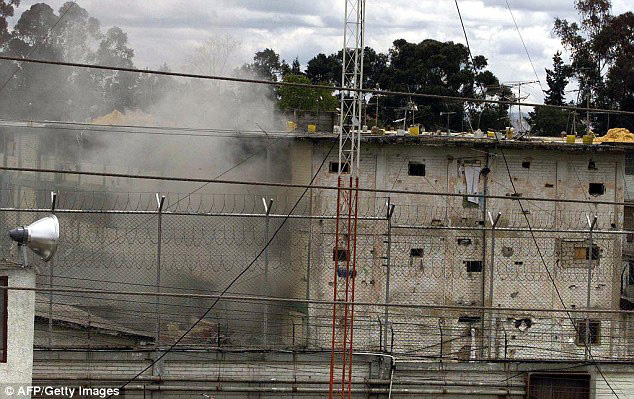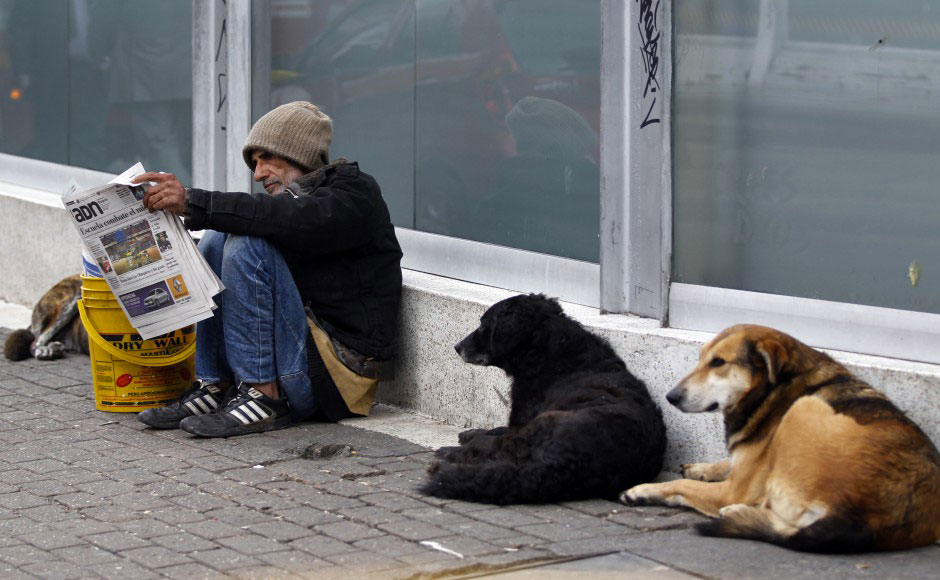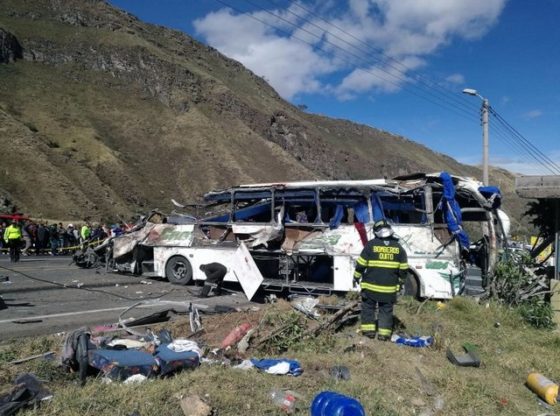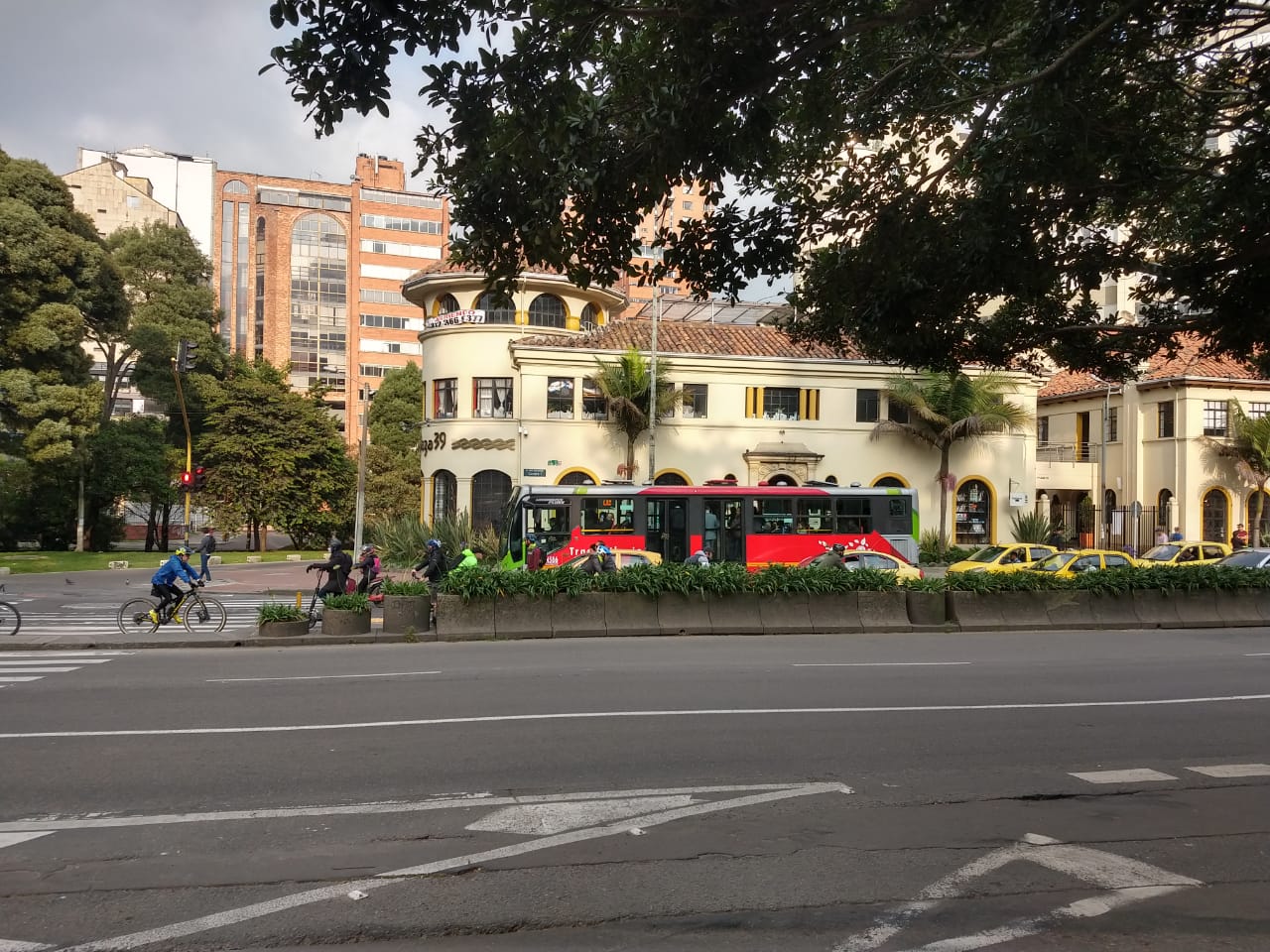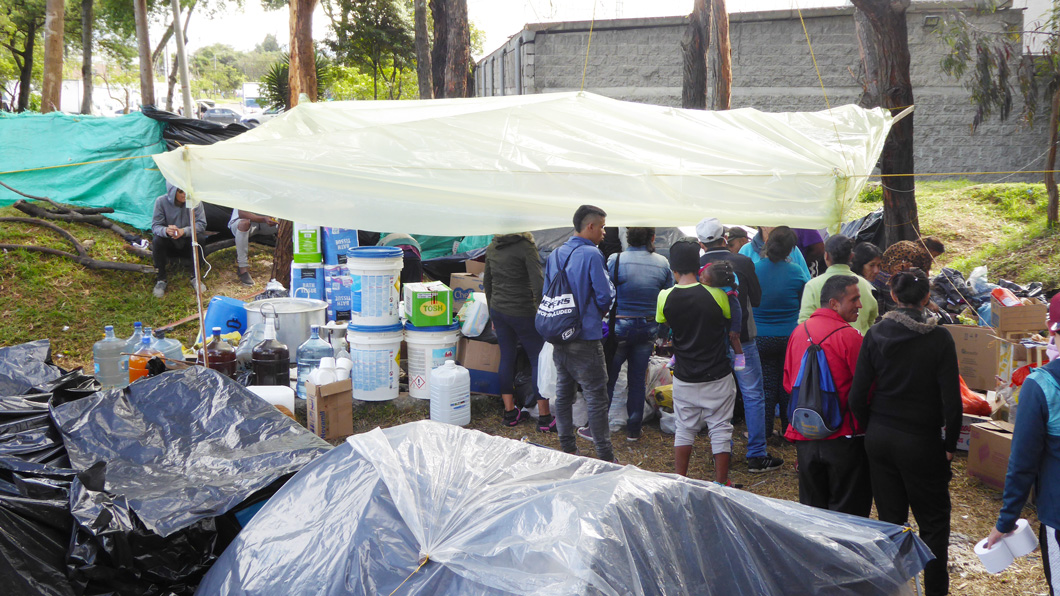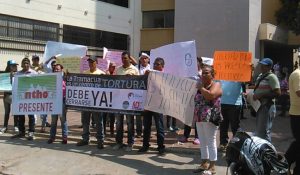
Friends and family members demonstrate outside the prison. Photo: Fundación Lazos de Dignidad
Wally Broderick gives an insight into the hell that is La Tramacúa – Colombia’s most inhumane prison
The latest letter from the 193 inmates of Tower 3 at La Tramacúa prison, who have been on hunger strike since April 6, complains of a lack of water, lack of medical care, excessive heat, inadequate ventilation and tortuous conditions.
“We are launching an SOS to the honourable Judge Luis Ernesto Vargas Silva to please hear our cries, because the constitution does not allow the death penalty […] and we are dying.”
According to human rights advocates Fundación Lazos de Dignidad, three of the strikers sewed their mouths shut on May 1 in order to draw attention to the institutional indifference to the prolonged strikes.
The latest hunger strike – the second this year – is one of a series of protests both inside and outside the prison by those trying to either significantly improve conditions at the prison, or to close it entirely.
This is the last stop for the least desirable. Nothing to expect, but the stench of accumulating excrements, accentuated by the unbearable heat that builds up in dark, crowded dungeons. Inhabited by clouds of relentless flies, and despised human beings, life slowly slips away, day after day, for those that have been forgotten. Despair is the only possible feeling for about 1,500 people that end up in La Tramacúa, a building that basically has no running water, a place where hygiene is simply not a possibility, and where the authorities do little more than repress any protests or pleas that arise.
The High and Medium Security Prison of Valledupar, known as La Tramacúa, has become Colombia’s most infamous penitentiary, which is saying something in a country where prisons are known for their massive overcrowding and horrific conditions. As far back as 1998, the constitutional court demanded change by declaring the flagrant violation of human rights in the country’s prisons unconstitutional.
However, the situation has continued to become ever more critical. According to a 2015 report from INPEC, the government agency responsible for prisons, the Colombian prison system currently has a capacity for about 77,000 people and an actual confinement of nearly 120,000 – meaning that prisons are overpopulated by more than 50%. This is compounded by the pitiful investment in any type of rehabilitation or resocialisation programmes for inmates.
La Tramacúa was the first of 15 prisons to be built through a joint effort with the United States government as part of Plan Colombia. The idea was to create prison facilities while fulfilling the court’s 1998 mandate to improve living conditions. However, the building’s flaws were evident even before its opening in 2000. In theory, its design, based on the design of USP Coleman in Florida, assures an adequate water supply and climate control. However, in practice the conditions on the ground at Valledupar weren’t taken into account, with water supplies being inadequate due to insufficient water pressure and badly maintained pumps that rarely work.
 Lacking basic essentials
Lacking basic essentials
The Fundación Lazos de Dignidad says that inmates at La Tramacúa have no access to basic hygiene due to the lack of running water, and that since there is no hydraulic water system, prisoners risk their lives trying to carry water up the outside of the towers.
Inadequate administration has meant the prison’s facilities have been improperly managed and little or nothing has been done to solve the problem as, of course, it is never an important point in any politician’s agenda. The installation is now the destiny of the most despised members of the prison community and has come to be known as the ‘punishment jail’ and the ‘Colombian Guantánamo’.
There is currently severe overcrowding because two of the prison’s towers have been closed for construction work since 2013. That leaves three or four inmates sharing cells designed for two, for around fifteen hours a day in temperatures averaging between 40 and 42 degrees without adequate ventilation.
Bogotá’s Modelo prison, where a number of body parts were found in the sewers.
Dismembered body parts found in prison walls
La Tramacúa is not the only prison in Colombia with deplorable living conditions. It recently came to light that at least 100 people were murdered or disappeared in the Modelo prison in Bogotá and in three other penitentiaries during the late nineties. There had already been evidence of these acts as early as 2000 when dismembered bodies were found in some of the walls of the prison as has been testified by a number of paramilitaries, and according to prison officers, had been reported to the Ministry of Justice at the time. Incredibly, to undertake an intervention to do a search and confiscate weapons was deemed too extreme a measure.
Yineth Bedoya, in her book Te hablo desde la prision, gives a gruelling account of the details of those years, witnessed by her source, someone who had been involved in the horrible events.
In the few toilets that are in use, human waste accumulates due to the sporadic lack of water. Consequently, due to the overload of the sanitary system, these facilities eventually flood, filling areas of the building with contaminated sewage, leading to an obvious health hazard. To alleviate this problem, prisoners have resorted to depositing their bodily waste in plastic bags which are then thrown into the yard through their windows. Not only does this add to the persistent foul smells and pollution, it also contributes to the proliferation of insects and vermin. There are also reports of faecal bacteria contaminating the food that is prepared in the badly kept and filthy kitchens.
There are extensive reports of the use of beatings and tear gas in the courtyards and cells whenever any kind of demand is made to improve conditions. Anyone who speaks out is mistreated physically and psychologically. Indeed, one of the three hunger strikers who sewed his lips together complained that he was subsequently beaten and had the stitches forcibly ripped out of his mouth. One inmate told El Espectador that protesters were sent to solitary confinement in an insect and pest infested detention room, known as ‘Villa Mosquito’.
Falling into drug dependency is a common response for many who cannot deal with the unbearable reality and, not surprisingly, there have been suicides which could have been avoided if attention to these individuals had been provided. To make matters worse, the ill are routinely denied access to adequate health services as the prison’s budget has been drastically decreased. According to Las 2 Orillas, prisoners are regularly given placebos in place of real medicine and three people have recently died due to poor health care.
Despite evidence of torture, its practice has not been admitted by the prison authorities. Even in the case of Luis Fernando Preciado, where eight guards were found guilty of his murder by leaving him tied up after a beating in 2002, the court declared it an isolated case and didn’t mention there having been torture involved. A report from the Fundación Comité de Solidaridad con los Presos Políticos, a human rights NGO, details witnesses’ testimonies and an audio recording that demonstrate Preciado had begged for mercy and to not be hit on the head. He was then put in chains, locked up alone in his cell, and left groaning in agony until his death two days later.

Prisoners waving ‘surrender’ to onlookers in a vain attempt to draw attention to their cause. Photo: www. afgj.org
Time for change?
Pressure is mounting on prison authorities for change. Back in 2014 the constitutional court ordered the closure of the prison if conditions did not drastically improve. Now the court is pressing for the implementation of the ruling.
On February 9, a local tribunal ruled that steps are being taken to solve the most pressing requirements and thus, the prison should remain open. This claim is strongly disputed by those inside and outside the prison.
On February 22, the constitutional court demanded reports from various parties into the measures that have been taken to improve conditions in the jail. The next day, 240 prisoners went on a hunger strike that lasted until March 17. They demanded the carrying out of the legal order to shut down the facilities, as well as immediate solutions to cover urgent basic needs such as the insufficient supply of water and mosquito nets to lower the risk of contagious diseases.
With the prisoners again on hunger strike, human rights organisations, NGOs and groups of inmates’ relatives and friends are campaigning for their needs to be met. It remains to be seen what the constitutional court will decide.
While the problems at La Tramacúa are extreme, many other Colombian prisons are also characterised by brutality and heinous conditions being inflicted on people who have been found guilty of charges that range from murder and illegal possession of weapons, to minor fraud and theft.
The lack of action taken to alter this systematic cruelty reflects a widespread lack of mercy towards those who are unfortunate enough to wind up in prison. Society’s indifference is particularly sad when, at the same time, it appears to ignore the rampant corruption and criminal behaviour of politicians.
Not only might the following months be crucial for La Tramacúa. Taking action to return dignity to those who have lost everything including their freedom is a basic step towards a long term peace. This is the time to show mercy. No crime justifies such inhumane treatment. This is the time to stand up for the underprivileged.
Don’t ignore what is happening in Valledupar
Join campaigners in making this simple plea to some of the contacts below: Tramacúa never again.
Juan Manuel Santos: [email protected]
Corte Constitucional de Colombia: @CConstitucional
Jorge Armando Otálora Gómez (Defensoría del Pueblo):
[email protected]Alejandro Ordóñez Maldonado (Procuraduría General de la Nación):
[email protected]
By Wally Broderick

